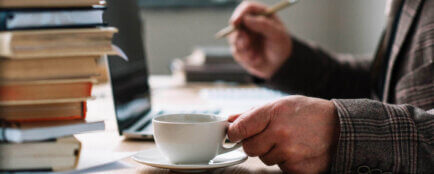At the heart of the dispute was a graphic created by an application called DALLE, based on the plaintiff’s alleged brief: ‘create a visual representation of two parties signing a business contract in a formal setting, for example in a conference room or a law firm office in Prague. Just show your hands.” However, the created work appealed to a person other than the commissioner, who placed it on his website.
The commissioning party therefore sued, seeking not only a declaration of authorship, but also injunctive and declaratory relief on the basis of the defendant’s alleged tortious interference with the plaintiff’s copyrighted work.
Both parties agreed that the image at issue in the action was created by an artificial intelligence on the basis of the plaintiff’s instructions and that the defendant had placed it on its website. There was therefore no conflict.
Are you solving a similar problem?
Are you interested in copyright law?
When you run a business, you will encounter copyright in a variety of situations. The copyright work may be a product you produce directly, the result of work you do for a client, or your copyright work you pass on to your customers for further use. But you may also be using someone else’s copyrighted work on your website, and sometimes you may not even know that a particular photograph, text or other product is copyrighted and that you must always have the proper permission to use it.
I want to consult
- When you order, you know what you will get and how much it will cost.
- We handle everything online or in person at one of our 6 offices.
- We handle 8 out of 10 requests within 2 working days.
- We have specialists for every field of law.
However, the defendant claimed that the image created by the AI did not meet the requirements of a copyrightable work under the Copyright Act. The plaintiff cannot be considered the author of the image and therefore the action is wholly and in all respects unfounded. That interpretation also justified the fact that he had not reacted in any way to the request to remove the graphic from his website.
As a general rule, an author whose right has been unlawfully interfered with or is threatened with unlawful interference may claim, in particular:
- establish his authorship,
- prohibition of the threatened infringement of his right, including threatened repetition, or unlawful interference with his right, in particular prohibition of unauthorised production, unauthorised commercial sale, unauthorised import or export of the original or a reproduction or imitation of the work, unauthorised communication of the work to the public, as well as unauthorised publicity, including advertising and other publicity,
- communication of information concerning the manner and extent of unauthorised use (…), and
- remedying the consequences, in particular by withdrawing the unauthorised reproduction or imitation of the work or device, product or component (…).
In his decision, Soudse dealt with the concept of copyright and author. According to the Copyright Act, the subject matter of copyright is a literary work and other artistic and scientific work which is the unique result of the author’s creative activity and is expressed in any objectively perceptible form, including electronic form, permanently or temporarily, regardless of its scope, purpose or meaning.
At the same time, the Copyright Act provides that a work shall not include, in particular, the subject matter of the work per se, a daily report or other data per se, an idea, procedure, principle, method, discovery, scientific theory, mathematical or similar formula, statistical graph or similar subject matter per se. Its author is the natural person who created the work.
In litigation, as a rule, the plaintiff bears the so-called burden of proof. That is, the burden of proving the fact alleged and of producing evidence to support the claim. The defendant, on the other hand, should bring evidence that supports its claims and undermines the plaintiff’s claims.
In this case, the plaintiff should have shown how the graphic was created and the specific assignment, the specific person, the artificial intelligence that created the graphic in question.
The applicant stressed that the image was created by the artificial intelligence on the basis of its specific assignment, and therefore considered itself to be the author of the image. However, he did not substantiate this claim with anything other than his declaration, even when subsequently summoned by the court. According to the court, it was therefore not proven that the AI had created the image in question on the basis of the plaintiff’s assignment as set out in the petition.
Tip for article
When you run a business, you will encounter copyright in a variety of situations. The copyright work may be a product you produce directly, the result of work you do for a client, or your copyright work you pass on to your customers for further use. But you may also be using someone else’s copyrighted work on your website, and sometimes you may not even know that a particular photograph, text or other product is copyrighted and that you must always have the proper permission to use it. A separate article discusses this topic in more detail.
But authorship cannot (at least for now) be attributed to artificial intelligence. Moreover, an image created by artificial intelligence does not constitute a work of authorship and does not meet the conceptual characteristics of a work of authorship, as it is not the unique result of the creative activity of a natural person – the author. According to the court, the applicant did not personally create the work, it was created by artificial intelligence and it was not proven in the proceedings on the basis of what specific assignment. With regard to the assignment itself, which was allegedly intended to be the basis for the subsequent image created by the artificial intelligence, it is possible to talk about the subject matter of the work or possibly an idea, but these are not expressly copyrightable.
For all these reasons, the court found the action unfounded and dismissed it.
Despite the fact that the applicant failed in his claim, this judgment is undoubtedly significant as it highlights the need to reflect on the capabilities of artificial intelligence and their use (or misuse) by man. This case and others like it will surely, in time, force us to think differently about copyright (or other areas of law). And perhaps even the now completely absurd idea that artificial intelligence has some legal personality will not seem strange to us in a few (decades) years.




